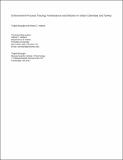Enforcement Process Tracing: Forbearance and Dilution in Urban Colombia and Turkey
Author(s)
Bozçağa, Tuğba; Holland, Alisha C.
Download12116_2018_9274_ReferencePDF.pdf (1.253Mb)
Publisher Policy
Publisher Policy
Article is made available in accordance with the publisher's policy and may be subject to US copyright law. Please refer to the publisher's site for terms of use.
Terms of use
Metadata
Show full item recordAbstract
Cities are complex regulatory environments. Attempts to regulate urban behavior create opportunities for politicians to manipulate enforcement to win votes and reward supporters. While some politicians choose not to enforce regulations, or forbearance, others undercut their intent, or dilution. Empirical research on enforcement has lagged behind due to the identification challenges in distinguishing weak state capacity from political manipulations. We develop a structured approach to process tracing that follows enforcement decisions sequentially across bureaucracies and specifies statistical distributions as counterfactuals to identify the causes of limited enforcement. We illustrate these strategies through original data on enforcement against squatters in urban Colombia and the provision of building permits in urban Turkey. Enforcement process tracing helps to document a form of distributive politics that is common to cities in the developing world.
Date issued
2018-08Department
Massachusetts Institute of Technology. Department of Political ScienceJournal
Studies in Comparative International Development
Publisher
Springer Science and Business Media LLC
Citation
Bozçağa,Tuğba and Alisha C. Holland. "Enforcement Process Tracing: Forbearance and Dilution in Urban Colombia and Turkey." Studies in Comparative International Development 53, 3 (August 2018): 300–323. © 2018 Springer Science Business Media, LLC
Version: Author's final manuscript
ISSN
0039-3606
1936-6167